Corruption Growing in Mexico, Group Says
Corruption has grown in the past few years and affected 10.3 percent of Mexican households’ transactions and requests for public services in 2010, Transparencia Mexicana, or TM, said in a new report, which looked at 35 common interactions between the public and government institutions.
“More than 200 million acts of corruption” occurred last year at the federal, state and municipal government levels, costing Mexicans 32 billion pesos (nearly $2.8 billion), the non-governmental organization said.
“This represents an additional tax of more than 14 percent on the average incomes of Mexican households,” TM technical advisory council member Edmundo Berumen said, adding that for those earning the minimum wage of 1,800 pesos ($155) per month, it totaled 33 percent of income.
Mexico’s least corrupt states, according to the TM study, are Baja California Sur, Durango, Nayarit and Aguascalientes, while the most corrupt are Oaxaca, Guerrero, Mexico state and the Federal District.
Corruption affected 22.6 percent of public dealings in Mexico City in 2001, but the rate is down by 4.7 percentage points since then, Berumen said.
“More than 200 million acts of corruption” occurred last year at the federal, state and municipal government levels, costing Mexicans 32 billion pesos (nearly $2.8 billion), the non-governmental organization said.
“This represents an additional tax of more than 14 percent on the average incomes of Mexican households,” TM technical advisory council member Edmundo Berumen said, adding that for those earning the minimum wage of 1,800 pesos ($155) per month, it totaled 33 percent of income.
Mexico’s least corrupt states, according to the TM study, are Baja California Sur, Durango, Nayarit and Aguascalientes, while the most corrupt are Oaxaca, Guerrero, Mexico state and the Federal District.
Corruption affected 22.6 percent of public dealings in Mexico City in 2001, but the rate is down by 4.7 percentage points since then, Berumen said.
The tax payment process was the least tainted by corruption, while the most common corrupt practices revolved around traffic stops by police, who often demand bribes.
Looking for a reprint of this article?
From high-res PDFs to custom plaques, order your copy today!



